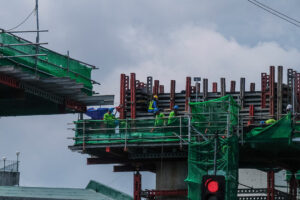By Aubrey Rose A. Inosante, Reporter
GOVERNMENT infrastructure spending is unlikely to be significantly affected by the ongoing probe on anomalous flood control projects, the Department of Budget and Management (DBM) said.
“There could be some effect if irregularities are detected in specific projects, since it would not be prudent to continue while those projects remain under investigation,” Budget Secretary Amenah F. Pangandaman told BusinessWorld in a Viber message on Tuesday.
The Marcos administration has intensified its investigation on public works projects, particularly in flood mitigation projects that were nonexistent or uncompleted despite billions in funding.
Ms. Pangandaman said there should be minimal or no disruption in ongoing and compliant projects even with the creation of the Independent Commission on Infrastructure (ICI). The ICI was tasked to investigate anomalies in flood control and other infrastructure projects, with authority to recommend criminal, civil and administrative charges.
“In fact, the ICI mechanism is designed to reinforce transparency and accountability in the system, which ultimately supports more efficient and credible public expenditure,” she said.
Data from the DBM showed expenditure on infrastructure and other capital outlays rose by 6.5% year on year to P148.8 billion in June, following the lifting of the election spending ban in early May.
This brought first-half infrastructure spending to P620.2 billion. The full-year infrastructure program is set at P1.51 trillion, or 5.3% of gross domestic product.
Department of Economy, Planning, and Development (DEPDev) Undersecretary Rosemarie G. Edillon said infrastructure rollout will proceed unless suspension orders are issued.
“Unless there’s an actual suspension, otherwise the utilization will drop. I’m not sure how they’ll manage that,” Ms. Edillon said on the sidelines of a House briefing.
Nigel Paul C. Villarete, senior adviser on public-private partnerships at Libra Konsult, Inc., said the ICI’s creation may momentarily slow down project execution, but will not dampen overall infrastructure spending.
“Improving transparency and resisting delays caused by mismanagement and/or corruption is beneficial to the overall infrastructure development of the country, both locally, and ODA (official development assistance)-funded,” Mr. Villarete said.
DEPDev earlier warned that the country’s ODA partners are closely watching how the government addresses corruption in flood control and other infrastructure projects.
Pantheon Macroeconomics Chief Emerging Asia Economist Miguel Chanco said the ICI’s mandate may cause hesitancy in new infrastructure spending in the short and medium term.
“(This is) due to the fact that these will soon be under the microscope for any potential allegations of corruption. While the ICI’s task is very much welcome and long overdue, it could stifle economic activity in the interim,” Mr. Chanco said in an e-mailed statement.
Aside from the ICI, separate investigations are being conducted by lawmakers, the Bureau of Internal Revenue and Anti-Money Laundering Council.
